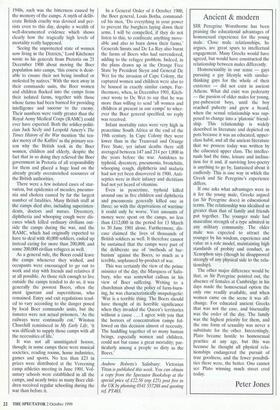THEY BROUGHT IT ON THEMSELVES
Andrew Roberts exposes the real reasons behind the mass deaths of Boers in British concentration camps
THE Boer War, which broke out a century ago next month, is today best remembered for the concentration camps which were set up by the British in which an estimated 20,000 Boer (i.e. Afrikaner) women and children, as well as a further 12,000 blacks, met their deaths. It is a standing indict- ment of the British Empire, and has always been blamed on a heartless, negligent British administration which did not care how many innocent non-combatants died of disease and starvation in its ruthless pursuit of victory on the veldt. Even the British Liberal leader at the time, Sir Henry Campbell-Bannerman, denounced what he called the 'methods of barbarism'. But was it really like that? Very detailed evidence from the records of the camps themselves, which have lain largely unconsulted for nearly a century in the official 'Blue Book' records, show that, although no one liked to admit it at the time or since, the Boers themselves dra- matically added to the scale of the tragedy by obstinately pursuing ignorant and superstitious medicinal practices, against the help and advice of the British person- nel on the spot, who became frantic in their inability to halt the disaster.
A distressingly large number of the Boers' quack remedies involved animal dung, which inevitably added massively to the diphtheria and dysentery which so increased the death toll. Pigs' manure was used as medicine for a child in Krugers- dorp camp, for example; goat droppings in oil were taken medicinally at Pietersburg camp; goat dung was put on a measles rash in Middleburg camp; a cow-dung bath was employed to fight rheumatism; and, at another camp, the British nurses found boiled and strained horse dung being eaten by a mother and child, not out of hunger but for its supposed medicinal properties. Urine and slops were often just thrown out of hut and tent doors. The Boer matriarchs in the camps utterly refused to halt these practices in the face of modern medical knowledge.
Despite subsequent propaganda, by Joseph Goebbels among many others, the British did not invent concentration camps. The `recconcentrado' camps had been used by the Spanish in Cuba to intern guerrillas two years earlier. Nor were they anything like the extermination camps of Nazi Ger- many, being set up for the protection of the Boers who had flooded into them for food, shelter, clothing and, above all, physical protection when the men left their home- steads to fight. Once the harsh homestead- burning policy was adopted, there was often no alternative accommodation on the veldt.
Blatant lies about the British putting fish-hooks into bully-beef and ground glass into food, and of pigs devouring the corpses of children, were officially taught in South African schools as late as the 1940s, such was the bitterness caused by the memory of the camps. A myth of delib- erate British cruelty was devised and per- sists even to this day, despite a wealth of well-documented evidence which shows clearly how the tragically high levels of mortality really happened.
'Seeing the unprotected state of women now living in the Districts,' Lord Kitchener wrote to his generals from Pretoria on 21 December 1900 about moving the Boer population into camps, 'this course is desir- able to ensure their not being insulted or molested by natives.' With the men away in their commando units, the Boer women and children flocked into the camps from their isolated farms, together with those whose farms had been burned for providing intelligence and succour to the enemy. Their numbers were vastly greater than the Royal Army Medical Corps (RAMC) could ever have expected. Both the soldier-politi- cian Jack Seely and Leopold Amery's The Times History of the War mention 'the ten- der mercy of the Kaffirs' as the primary rea- son why the British took in the Boer women, children and elderly, despite the fact that in so doing they relieved the Boer government in Pretoria of all responsibility for them and placed a huge load on the already greatly overstretched resources of the British authorities.
There were a few isolated cases of star- vation, but epidemics of measles, pneumo- nia and cholera caused by far the largest number of fatalities. Many British staff at the camps died also, including superinten- dents, doctors and nurses. Dysentery, diphtheria and whooping cough were dis- eases which killed ordinary civilians out- side the camps during the war, and the RAMC, which had originally expected to have to deal with 40,000 soldiers, ended up instead caring for more than 200,000, and some 200,000 civilian refugees as well.
As a general rule, the Boers could leave the camps whenever they wished, and occupants were encouraged to go out to work and stay with friends and relatives if at all possible. As those rich enough to live outside the camps tended to do so, it was generally the poorest Boers, often the most ignorant and superstitious, who remained. Entry and exit regulations tend- ed to vary according to the danger posed by local Boer commando units, but the inmates were not actual prisoners. `As the railways were continually cut,' Winston Churchill reminisced in My Early Life, 'it was difficult to supply those camps with all the necessities of life.'
It was not all unmitigated horror, though; in some camps there were musical societies, reading rooms, home industries, games and sports. No less than £23 in prizes were distributed at the Vereening camp athletics meeting in June 1901. Vol- untary schools were established in all the camps, and nearly twice as many Boer chil- dren received regular schooling during the war than before it. In a General Order of 6 October 1900, the Boer general, Louis Botha, command- ed his men, 'Do everything in your power to prevent the burghers laying down their arms. I will be compelled, if they do not listen to this, to confiscate anything move- able and also to bum down their farms.' Generals Smuts and De La Rey also burnt the farms of Boers who had surrendered, adding to the refugee problem. Indeed, in the plans drawn up in the Orange Free State by President Steyn and General De Wet for the invasion of Cape Colony, the captured women and children were also to be housed in exactly similar camps. Fur- thermore, when, in December 1901, Kitch- ener wrote to De Wet to say that he was more than willing to send 'all women and children at present in our camps' to wher- ever the Boer general specified, no reply was received.
Infant mortality rates were very high in peacetime South Africa at the end of the 19th century. In Cape Colony they were lower than in the Transvaal and Orange Free State, yet infant deaths there still averaged between 147 and 214 per 1,000 in the years before the war. Antidotes to typhoid, dysentery, pneumonia, bronchitis, whooping cough, diphtheria and malaria had not yet been discovered in 1900. Anti- septics were in their infancy and dietitians had not yet heard of vitamins.
Even in peacetime, typhoid killed around one in five children and diphtheria and pneumonia generally killed one in three; so with the deprivations of wartime it could only be worse. Vast amounts of money were spent on the camps, no less than /112,000 in the period for 13 March to 30 June 1901 alone. Furthermore, dis- ease claimed the lives of thousands of British soldiers as well. It therefore cannot be sustained that the camps were part of the deliberate use of `methods of bar- barism' against the Boers, so much as a terrible, unplanned by-product of war.
This was certainly the view of the prime minister of the day, the Marquess of Salis- bury, who was somewhat callous in his view of Boer suffering. Writing to a churchman about the policy of farm-burn- ing, he was characteristically unapologetic: `War is a terrible thing. The Boers should have thought of its horrible significance when they invaded the Queen's territories without a cause .. I agree with you that the horrors of concentration camps fol- lowed on this decision almost of necessity. The huddling together of so many human beings, especially women and children, could not but cause a great mortality; par- ticularly among a people so dirty as the Boers.'
Andrew Roberts's Salisbury: Victorian Titan is published this week You can obtain a copy from the Spectator Bookshop at the special price of£22.50 (op £25) post free in the UK by phoning 0541 557288 and quoting ref PT403.











































































 Previous page
Previous page